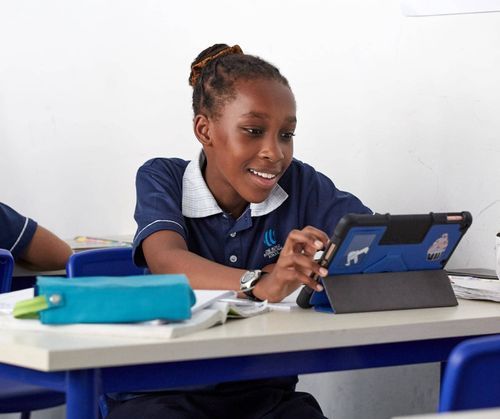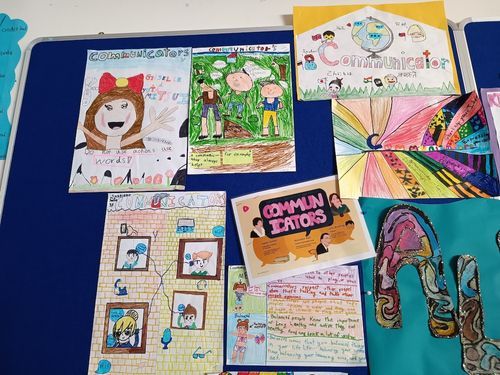Children today have grown up side-by-side with technology. You know that technology is a powerful tool that can broaden your child’s horizons, but it can also be dangerous. It’s imperative that children learn the importance of using technology safely and effectively at all times.
Your child should understand basic internet safety, such as setting strong passwords, being aware of stranger danger online, understanding the digital footprint concept, and being respectful online. Your child should also learn how to become a good digital citizen, who knows how to engage responsibly online and who can differentiate between fact and fiction in the digital sphere.
At One World International School, we leverage the power of technology while teaching your children how to use it responsibly. You can use this guide to help you and your children better understand the importance of digital literacy and digital citizenship.
What is Digital Literacy?
Digital literacy falls under the umbrella of information literacy. A digitally literate child will understand how to use their favourite devices and technological tools to obtain information. Beyond that, they will learn which sources are appropriate to use in order to gain factual information, and which sources may be spreading false information on the internet. In addition to learning how to use digital tools to get information, students will also learn more about the ethics associated with gaining knowledge online, as part of their digital literacy learning. They will learn about the importance of citing various sources when they use them, and responsibly consuming or sharing information that they have found online.
What does Digital Citizenship mean?
The concept of digital citizenship focuses on a child’s behaviour online. Students begin learning about cyber safety and digital citizenship from the time they start using devices that are connected to the internet. Some of the most important concepts that are covered under digital citizenship lessons include:
- Creating and storing secure passwords
- Understanding what is and is not personal information and learning about the importance of keeping personal information private
- Knowing that photographs can inadvertently reveal private information when the images are shared online
- Understanding that their tone, voice and actions online will leave a digital footprint that will remain for years to come
Why is Digital Literacy and Digital Citizenship Important for Students of All Ages?
From the moment your child begins using a smartphone or tablet for educational or entertainment purposes, they should be aware of both the concepts of digital literacy and digital citizenship. You can use these age-based guidelines when determining how and when to introduce these concepts to your children:
- Early Childhood Students — Allow your child to use technology with you or alongside you. Avoid letting them play online alone, and monitor all interactions. This can help you become aware of any issues that may arise.
- Primary School Students — Give your child the freedom to begin using age-appropriate apps and games. Verify that all of the parental control settings are in place. Primary school students should know how to create secure passwords and how to maintain anonymity online. They should also be taught to speak kindly online and be open with their parents about any issues that arise in the digital realm.
- Secondary School Students — Secondary school students may have to interact online at various levels, and it’s important that they have a well-developed sense of digital citizenship. They should be aware of online etiquette and understand the warning signs of someone who may not have good intentions when interacting with them.
How Can You Help Your Children Use Technology Safely and Effectively at Home?
One of the most important things you can do as a family is to create a family digital agreement. This agreement can outline rules for all members of the household to follow. You should establish screen time limits for all family members, and make sure that those limits are adhered to. You should agree as a family about which activities can be enjoyed online and at home, and you can work to differentiate between valuable online content and content designed strictly for entertainment.
Know the Benefits of Using Technology in the Classroom

Children today are digital natives, and it’s only natural to assume that they will use technology in their classrooms. Children realise many benefits when they are introduced to technology in a safe and useful way. These are some of the top benefits of incorporating technology into the classroom:
- Technology allows students to collaborate in innovative and exciting ways.
- Digital tools allow teachers to personalise the learning experience for your child.
- Technology affords children the ability to receive near-instant feedback from their teachers.
How OWIS Imparts Digital Literacy to Our Students
At OWIS, we believe that technology plays an integral role in educating 21st-century learners, which is why we incorporate it into all learning levels. As such, we emphasise the importance of digital literacy, cyber safety and digital citizenship to all our students. All of our students (or their parents) sign an ICT agreement that outlines the rules and guidelines for using technology at school. We introduce the concepts of digital literacy and digital citizenship in age-appropriate ways at every level of learning to our students.
Students of all ages are going to be content consumers as well as content creators on the internet. As such, it’s vital that students develop a solid understanding of what it means to be a good digital citizen. Your child will need to be practising these skills now to effectively use them in the future in whatever role they take on.
Tell us more about your digital citizenship rules at home. What has worked for your child? What lessons have you and your child learned? Share your thoughts on our Facebook page, and don’t forget to follow OWIS on Instagram and Twitter for our school’s latest updates.
(All OWIS photographs in this blog article were taken pre-Covid. The school is adhering to hygiene protocols and social distancing measures as recommended by the CPE and Ministry of Health, Singapore.)















